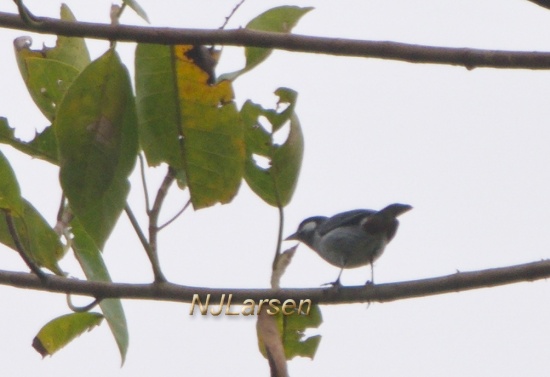- Conirostrum leucogenys
Identification
9.5 cm. A rather small, short-tailed conebill.
Male
- Shiny black crown and nape contrasting with white cheek and ear-coverts
- Thin, sharply pointed, black bill
- Dark bluish-grey upperparts with narrow white rumpband (usually not visible)
- Dusky blue-grey upperwing and grey
- Pale grey throat to belly with bluish tinge, white centre of belly
- Chestnut undertail-coverts
Female
- Dull bluish-grey upperparts with whitish rump
- Pale buff lores, narrow eyebrow, side of head and underparts
- Olive tinge on breast, yellowish tinge on belly
panamense is darker, cyanochroum is only slightly darker above and darker grey on breast than the nominate.
Distribution
From eastern Panama to Colombia and western Venezuela.
Uncommon to locally fairly common.
Taxonomy
Three subspecies recognized:
- C. l. panamense from eastern Panama to northwestern Colombia
- C. l. leucogenys from northern Colombia to northeastern Venezuela
- C. l. cyanochroum in the Andes of western Venezuela (Mérida) and Sierra de Perijá
Habitat
Dry to moist lowland forests, open woodland, gallery forest, cacao plantations and in tall spreading legumes in pastures. Occurs from sea-level up to 800 m, one record in Venezuela at 1300 m.
Behaviour
Diet
Not well known, recorded to feed on arthropods and nectar. Forages in lively pairs or parties of 3 to 5 birds, sometimes in small mixed-species flocks. Often hangs upside-down from leaves.
Breeding
Very little information. A pair building a nest in January in Colombia, birds in breeding condition recorded in January, April and May.
Movements
A resident species.
References
- Clements, J. F., T. S. Schulenberg, M. J. Iliff, D. Roberson, T. A. Fredericks, B. L. Sullivan, and C. L. Wood. 2016. The eBird/Clements checklist of birds of the world: v2016, with updates to August 2016. Downloaded from http://www.birds.cornell.edu/clementschecklist/download/
- Handbook of the Birds of the World Alive (retrieved August 2016)
- Gill, F and D Donsker (Eds). 2016. IOC World Bird Names (version 6.3). Available at http://www.worldbirdnames.org/.
Recommended Citation
- BirdForum Opus contributors. (2024) White-eared Conebill. In: BirdForum, the forum for wild birds and birding. Retrieved 2 May 2024 from https://www.birdforum.net/opus/White-eared_Conebill





